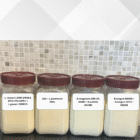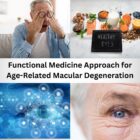The Effect Of Oxidative Stress On Human Body
Oxidative Stress can be described as the overaccumulation of oxidants versus antioxidants, leading to cellular and tissue damage. Oxidative stress closely correlates with inflammation, and inflammation is closely correlated with oxidative stress. Both reactive oxygen species (ROS) and reactive nitrogen species (RNS) free radicals play a role in the development of oxidative stress. In this blog, we explain, how oxidative stress affects other organs, what are the major causes and how to maintain good health despite having this imbalance.

What Is Oxidative Stress
For a healthy body, free radicals and antioxidants are very crucial. When there is an imbalance between the production of free radicals and antioxidants, It is described as Oxidative stress.
In normal conditions, our body produces free radicals as a by-product of the metabolic process. To a certain extent, the free radicals help in cells communication and support immune defense mechanisms.
The antioxidants are also produced in the cells and maintain the balance of free radicals in the body.

What are Free Radicals
A free radical can be described as a molecule with one or more unpaired electrons. For example:
- Superoxide
- Hydroxyl Radical
- Nitric Oxide Radical
Mitochondria is a powerhouse of the cell because it generates energy in the form of ATP (adenosine triphosphate).
In the mitochondria oxygen and glucose combine and produce carbon-di-oxide, water, and ATP. In this metabolic process, free radicals appear as by-products.
Some external elements (Exogenous Causes) can also be seen as a root cause of the accumulation of free radicals in the body. such as smoking, pesticides, pollution.
What are Antioxidants
Antioxidants are elements that neutralize or remove free radicals by giving an electron. This neutralizing effect, defend the body from oxidative stress.
Some examples of antioxidants are:
- Vitamin A
- Vitamin C
- Vitamin E
Sources of antioxidants can be different like free radicals. Glutathione is an example of a naturally produced antioxidant.
Food like fruits and vegetables are a great source of antioxidants that are present in the form of vitamins and minerals which can not be produced in the body.
Factors That Lead To Oxidative Stress
There are many factors that produce unnecessary growth of free radicals. They include:
- Food Intake (poor nutrition)
- Lack of physical activity
- Excessive Iron Intake
- Stress (physical, biochemical, mental and emotional)
- Certain Medication
- Environmental toxins
- Altered microbiome
- Smoking and Drinking
- Prolonged Intense Workout
The Adverse Effect Of Oxidative Stress On Human Body
Oxidation is our body’s natural process and it happens because of the imbalance between free radicals and antioxidants. In normal condition when they both function properly, helps body to fight against pathogens that causes infections.
The imbalance of these two may lead to many health issues, when the number of free radicals increases then the antioxidants, damages the DNA, fatty tissue, and proteins.
As we all know that proteins, lipids, and DNA are the primary component of the body. Damage of these can cause various diseases in the life span. Some are:
- Diabetes
- Obesity
- Insulin resistance
- Hypertension
- Rheumatoid arthritis
- Fatty liver
- Alzheimer Disease
- Chronic kidney disease
- Cancer
- Neurodegenerative Disease
- High Cholesterol
- Auto immune Disease
- Parkinson’s Disease

How Can We Protect Ourselves From Oxidative Stress
It is not possible to avoid free radical and oxidative stress completely. However, what we can do is lower the effect of oxidative stress on our body. We can minimize the stress by increasing antioxidants and decreasing free radicals formation in our bodies.
It is crucial to understand that we can minimize the effect of oxidative stress through an integrative approach. That include:
- Integrative Nutrition
- Integrative Lifestyle
- Key Supplements
Integrative Nutrition
The first thing is to get enough antioxidants through diet sources. It is advised that eating 5 servings of a variety of fruits and vegetables is very important for antioxidants production. Follow the anti-inflammatory diet plan
Some Fruits and Vegetables rich in antioxidants are:
- Citrus Fruit like orange, lemons,
- Cruciferous veggies: Broccoli, Cabbage, Cauli Flower
- Dark leafy green such as parsley, celery, avocados
- Phytonutrients rich fruits such as pomegranate, blueberries, grapes, cherries
Other Dietary Sources of Antioxidants are:
- Vitamin A, C, E
- Sulfor rich vegetable: Onion, Garlic
- Botanical Herbs: Cinnamon, Holy basil, Turmeric
- Herbal Tea, Clove Tea, Fennel Tea
- Nuts & Seeds like almonds, walnuts, pecans, pumpkin seeds, chia seeds, sesame seeds
- Dark Chocolate with high cacao content
Integrative Lifestyle
Lifestyle change also helps to reduce oxidative stress in the body. That include:
- Regular physical activity
- Reducing Alcohol Intake
- Avoid Overeating
- Reducing Stress
- Eating a Healthy, and Balanced Diet
- Include Rainbow vegetables and Fruits in Diet
- Limit intake of Processed food
- Avoid Exposure to Pollution and Harmful Chemicals
- Maintaining Healthy Weight
- Have a Quality Sleep
- Intermittent fasting
Key Supplements
- Vitamins such as Vitamin D, Vitamin K2, Vitamin C, Vitamin B complex (B12, B9, B6)
- Glutathione
- Magnesium
- Zinc, selenium (Brazilian nuts), CoQ10, ALA, Omega-3
- Ashwagandha, Berberine
- Multi-strain probiotics having strain of Lactobacillus helveticus, Bifidobacterium longum, Lactobacillus rhamnosus, Bifidobacterium breve, Lactobacillus reuteri, Lactobacillus gasseri, B. Coagulans.
- Prebiotic fiber such as FOS, Inulin, Acacia senegal
Lab Analysis
These are not the direct measures but the blood markers affected in the presence of oxidative stress.
- Serum uric acid above 6.0
- Decreased lympocytes count ( < 20)
- Decreased albumin ( < 4.0)
- Increased globulin ( > 2.8)
- Elevated bilirubin ( > 1.2)
- Platelet level ( < 150)
- Decreased HDL ( < 40)
Bottom Line
Oxidative stress happens when free radicals and antioxidants become out of balance. It can cause damage to various organs and can be life-threatening sometimes.
Some studies show the relationship between Inflammation and oxidative stress, so oxidative stress can be suppressed by an anti-inflammatory diet.
It is very crucial to keep in check on our free radicals exposure, some lifestyle changes and food choices can help our body to be in balance and protect from diseases.










Selenium For Optimal Health - Wellness By Rosh
28-Oct-21[…] acts as a significant antioxidant that fights against oxidative stress and supports your body from chronic […]
The Role of Alpha Lipoic Acid in Keeping us Healthy - Wellness By Rosh | Integrative Wellness
9-Feb-22[…] ALA supplement can prevent oxidative stress and efficiently neutralize free […]
Coenzyme-Q10: An Crucial Supplement for Hypertension, Metabolic Syndrome and Mitochondrial Dysfunction - Wellness By Rosh | Integrative Wellness
2-Mar-22[…] in the mitochondria of our cells. As we know that mitochondria produce energy, protect cells from oxidative stress and pathogenic bacteria and viruses. Coenzyme-Q is found naturally in every cell of our body and is […]
Glutathione The Master Antioxidant With Enormous Benefits - Wellness By Rosh | Integrative Wellness
1-May-22[…] protect your body from oxidative stress or free radicals that damage healthy cells and cellular DANs. Glutathione works as a master […]